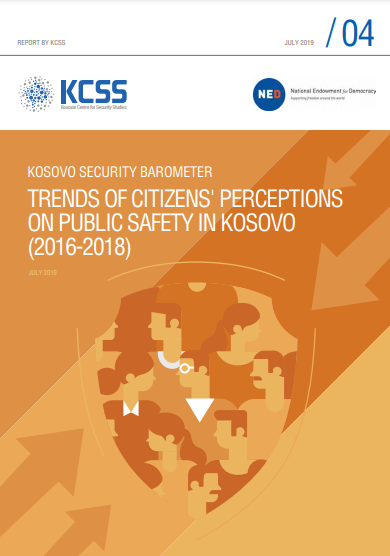25/07/2019

Kosovar Centre for Security Studies (KCSS)
National Endowment for Democracy (NED)
Donika Marku
Security is a key fundamental human right. Feeling safe or unsafe strongly affects the physical and mental health and wellbeing of citizens, and may lead to greater trust/distrust, which affects citizens’ socialization and sense of community. As a result, KCSS has paid particular attention to citizens’ perceptions regarding public safety and personal security since 2012 when the Kosovo Security Barometer was first launched.
This special edition of the KSB provides a summary of citizens’ perceptions of public safety in Kosovo over the past three years. More concretely, it highlights the perception trends on public safety focusing on the Kosovo Security Barometer (KSB) data collected during the period from 2016 to 2018. Data collected during this period focused on the main public safety concerns and issues of respondents as well as measured steps to be taken to improve public safety in Kosovo.
Various elements affect citizens’ perceptions regarding public safety. Indisputably, such attitudes are shaped by personal experiences. However, the importance of media and social networks in shaping citizens’ opinions cannot be ignored. Perceptions might be correlated with personal characteristics such as age, gender, ethnicity, education and economic status. Therefore, beyond general data analyses, this edition also includes cross-analyses of various public security threats with personal characteristics.
This report is published in the framework of the Kosovo Security Barometer Programe. Perceptions presented in this report are a summary of information gathered from respondents and it solely demonstrates how people perceive institutions. It is no way a conclusive assessment on the quality of the work of institutions subject to this study. It shall serve as an instrument to them toward addressing potential shortcomings, but also an indicator of the effectiveness of their communication with the people.
The views presented in this report are perceptions of the respondents and do not necessarily represent the views of Kosovar Centre for Security Studies. Opinions expressed in this report do not necessarily represent the views of the National Endowment for Democracy (NED).